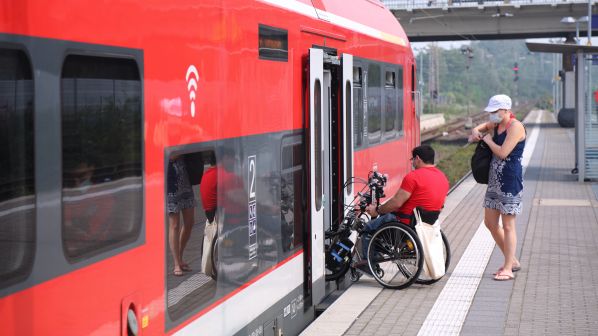THE European Parliament has approved an agreement with member states on revised rules for rail passengers’ rights, which guarantee that passengers can be re-routed and receive help when there are service delays and cancellations. Access and assistance for passengers with reduced mobility will also improve, and there will be more dedicated spaces for bicycles on trains.
If there is a delay of more than an hour, passengers can choose to either be fully reimbursed for the cost of the ticket, continue on their journey or be re-routed under comparable conditions, without facing additional costs. They must be able to travel in the same class as their original ticket.
The re-routing obligations will apply even in the event of force majeure and, if necessary, meals and refreshments will need to be provided, and accommodation costs reimbursed.
The new rules will also give more clarity on what can be considered a force majeure, which would exempt rail companies from paying compensation for delays or cancellations. In addition to extreme weather conditions and major natural disasters, the new rules now include major public health crises or terrorist attacks. Rail staff strikes will not be covered by this exemption.
The regulation includes a new obligation for carriers qualifying as a “sole undertaking” to offer their international, long-distance domestic and regional rail services as a through-ticket. This will ensure a more comprehensive protection for passengers against missed connections when travel is disrupted.
Infrastructure managers and operators will have to make real-time dynamic traffic and travel information available, including to ticket vendors and tour operators. The European Commission says allowing entities which sell tickets access to information on real-time delays, reservations and availability requests will boost dynamism in the rail ticketing market and support efforts to offer more innovative products.
If the rail operator does not communicate re-routing options within 1h 40min from the scheduled departure, passengers will themselves be able to organise travel on a different route by train or bus and be reimbursed for the “necessary, appropriate and reasonable” cost of the additional ticket.
The new rules include a strengthened complaint-handling mechanism, and reinforce the obligation for National Enforcement Bodies to cooperate. In the future, a new EU-wide standardised compensation and reimbursement form will be developed, which will be accessible for passengers with disabilities and reduced mobility.
Passengers with reduced mobility will have more flexibility when making travel arrangements, as they will only be obliged to notify the operator of their travel plans 24 hours in advance instead of 48 hours under current rules. This compares with 36 hours for bus and coach travel, and 48 hours for the air and waterborne sector. If they require an accompanying person, they will travel free of charge. Passengers with reduced mobility using an assistance dog will also be given assurances that the animal can travel with them.
In an effort to provide more sustainable mobility and comfortable alternatives, all trains must be equipped with dedicated spaces and racks for bicycles, with at least four bicycle spaces on each train.
The revised rules will apply in principle to all international and domestic rail journeys and services throughout the European Union, with a possibility for member states to exempt domestic rail services for a limited time.
The new regulation will be published in the Official Journal of the European Union on May 12 2021, and will enter into force on June 1, before being applicable as of June 6 2023.

